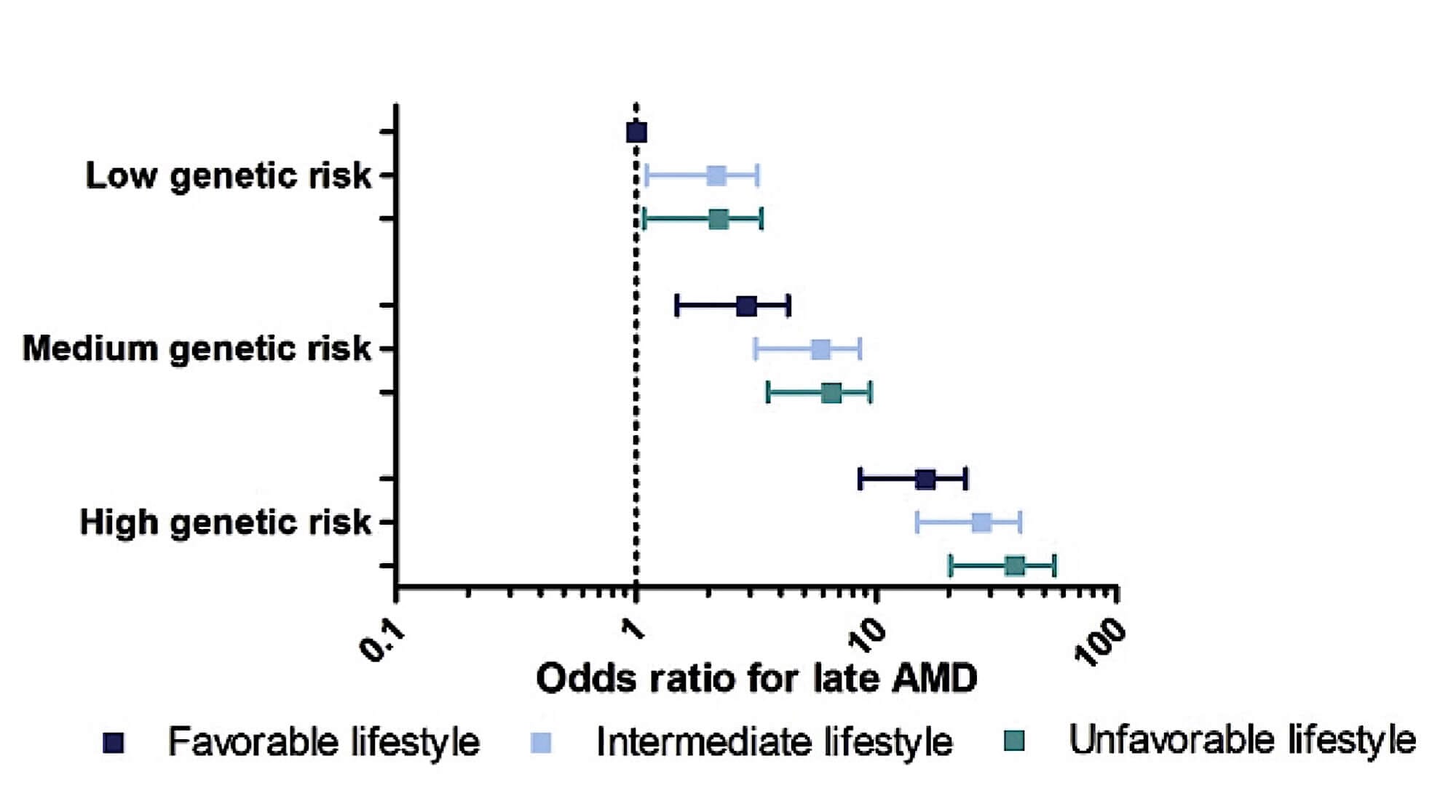Macular Degeneration: What Can you Do Yourself?

Losing your vision is one of the most life-altering things you can experience. Age-related macular degeneration (AMD) is one of the leading causes of vision loss in people over 50 (1). But here’s the good news: your lifestyle can absolutely make a difference.
What Is Macular Degeneration?
AMD is a condition where the central part of the retina—the macula—becomes damaged. Early on, you may barely notice anything: maybe your vision is a bit blurry or reading feels more tiring. As the disease progresses, you may experience visual distortion (metamorphopsia) or even a dark spot in the center of your vision. There are two types:
- Neovascular AMD (wet AMD) – abnormal blood vessels grow under the macula, causing leakage or bleeding.
- Atrophic AMD (dry AMD) – cells in the macula gradually degenerate.
Both forms can lead to severe central vision loss, which can significantly impact your daily life (1).
What Does Inflammation Have to Do With It?
Just like in rheumatoid arthritis, osteoarthritis, and cardiovascular disease, chronic low-grade inflammation plays a key role in AMD (2). Over time, this type of inflammation damages the retina—especially when combined with risk factors such as smoking, being overweight, or an unhealthy diet.

What Can You Do With Lifestyle?
At Plants for Health, we don’t believe in miracle cures—but we do believe in evidence-based lifestyle interventions. And this is exactly where you can make a difference with AMD.
Research shows that an unhealthy lifestyle (especially diet and smoking) increases the risk of AMD—even in people with no genetic predisposition. In fact, unhealthy habits nearly double the risk of developing AMD, and the risk is even higher for those who are genetically predisposed (3).
Here Are a Few Practical Recommendations:
1. Nutrition: Anti-inflammatory and Antioxidant-Rich
- Eat at least 800 grams of fruits and vegetables daily.
- Include dark leafy greens like spinach, kale, and arugula—rich in lutein and zeaxanthin, which help protect the macula.
- Base your diet on nuts, seeds, legumes, and whole grains.
- Add healthy fats from flaxseeds, walnuts, and algae oil—these contain omega-3 fatty acids, which may have protective effects.
- Limit processed foods, saturated fat, and sugar—and avoid smoking at all costs. Smoking is the #1 risk factor for AMD.
Some sources recommend generous use of olive oil. While people who consume more olive oil tend to have a lower risk of AMD, this does not prove a direct cause-effect relationship. At Plants for Health, we recommend using olive oil for cooking, but if you’re managing weight, use it in moderation: one tablespoon contains nearly 100 calories.
2. Supplements: Sometimes a Smart Move
In advanced AMD, supplementation with antioxidants and zinc (based on the AREDS2 formula) is often recommended. Always discuss this with your doctor (1). For everyone: make sure you’re getting enough vitamin D, vitamin B12, and omega-3 (EPA/DHA)—especially if you eat plant-based.
3. Movement and Relaxation
Physical activity and stress reduction lower inflammation throughout the body. A 30-minute walk daily and regular breathing exercises or meditation can already make a noticeable difference.
4. Sleep
Good sleep supports physical recovery, reduces inflammation, and lowers oxidative stress.
Above all, aim for consistency over perfection. Every step matters.
But Does It Work?
Yes. Research shows that people who eat well and live a healthy lifestyle have a lower risk of developing AMD—and if they already have it, slower disease progression. The greatest impact is seen in the early and intermediate stages, but even if you already have AMD, it’s never too late to support your health.
In short: your genes may load the gun, but your lifestyle pulls the trigger. And that’s something you can control.
Ready to take action? Our Plants for Health book is full of practical tips, recipes, and lifestyle tools. Or join the Plants for Health program for personalized support.
Sources
1. Richtlijnendatabase. (2023). Voedingsadvies ter preventie van LMD-progressie – Richtlijn Leeftijdsgebonden maculadegeneratie (LMD). Nederlands Oogheelkundig Gezelschap. https://richtlijnendatabase.nl/richtlijn/leeftijdsgebonden_maculadegeneratie_lmd/preventie_/voedingsadvies_ter_preventie_van_lmd_progressie.html
2. Chen J, Wang W, Li Q. Increased Th1/Th17 Responses Contribute to Low-Grade Inflammation in Age-Related Macular Degeneration. Cell Physiol Biochem. 2017;44(1):357-367. doi: 10.1159/000484907. Epub 2017 Nov 13. PMID: 29132135. https://pubmed.ncbi.nlm.nih.gov/29132135/
3. Colijn JM, Meester-Smoor M, Verzijden T, de Breuk A, Silva R, Merle BMJ, Cougnard-Grégoire A, Hoyng CB, Fauser S, Coolen A, Creuzot-Garcher C, Hense HW, Ueffing M, Delcourt C, den Hollander AI, Klaver CCW; EYE-RISK Consortium. Genetic Risk, Lifestyle, and Age-Related Macular Degeneration in Europe: The EYE-RISK Consortium. Ophthalmology. 2021 Jul;128(7):1039-1049. doi: 10.1016/j.ophtha.2020.11.024. Epub 2020 Nov 28. PMID: 33253757. https://www.aaojournal.org/article/S0161-6420(20)31119-2/fulltext